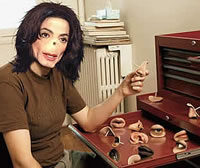


|
Home
Editor's Blog
Ethos
Forums
Links
Contact
About
 |
 |
©
NHSBlog |
| If you sympathise with, or simply enjoy NHSBlog, please add a link to us from your site or email us to swap links |
| If you would like to contribute to NHSBlog please email the editor. Your identity will NEVER be published unless you expressly give your permission. | ||
Infection
Control - a few words Today I had occasion to drive my wife into the our district hospital for an X-ray and consultation. The whole procedure was quick, efficient and impressive (discounting the waiting list for the appointment). The staff were helpful and friendly. The hospital was liberally plastered with notices exhorting both staff and patients to wash their hands so, just for now, let’s ignore the almost universal practice of allowing staff and patients alike to shoulder their way into a toilet and then, after exhorting them to wash their hands, forcing them to use bacteria-laden knobs and handles to get out again… The NHS goes to no little trouble and expense to help prevent cross-infections so what I found in the excellent and well-appointed League of Friends shop in the main foyer was a bit of a bummer. Taking pride of place on the counter were several piles of grubby used paperbacks for sale. I shudder to think how many of these were purchased by unthinking visitors and then taken given directly to in-patients who have little to do all day except read, scratch themselves as they heal – whatever. It takes little imagination to predict just how many infectious organisms might inhabit such a book after several round trips between the ward, the day-room and the League of Friends shop. I’m not really apportioning blame here, the League of Friends volunteers are not infection-control professionals and quite possibly no-one on the infection-control staff uses the shop. The trouble is, not all the professionals are that well informed either. I have unimpeachable knowledge of an event concerning a known MRSA carrier, an in-patient in a small mental health unit. Quite properly, an infection-control advisor was called in to give a talk to the whole staff (about 15 in all) on how to handle things. She gave her talk and asked for questions - long silence from all the nursing staff and the unit manager etc. Eventually the only question came from the office manager. "How long can the MRSA organism live on... say a kitchen work-surface for instance?". The answer? "No-one's ever asked me that before, I don't know. Can I get back to you?" Anyway, I digress. But I do think that second hand books in constant circulation around an infection-prone environment are a good example of how easily organisations can overlook glaring breaches of vital protocols – and how naturally an outsider notices these things. Crikey, here's another horrible thought - what about all the old magazines in the reception areas and waiting rooms? So, here's my plan... I will offer my services as a well-paid and observant independent consultant on the ‘bleeding obvious’. On second thoughts, maybe not such a good idea. That’s a great story for another day. |
 Of course, books aren't always unhygienic - and neither is picking your nose, as Jacko demonstrates for us. |
|
| If you sympathise with, or simply enjoy NHSBlog, please add a link to us from your site or email us to swap links | ||